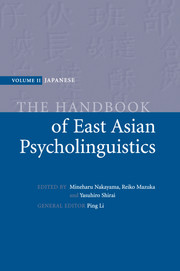Book contents
- Frontmatter
- Contents
- List of figures
- List of contributors
- In memory of Miwa Nishimura
- Preface
- Introduction
- Language acquisition
- 1 Ontogeny of language
- 2 Caregivers' speech
- 3 The intrinsic link between gesture and speech at the prelinguistic stage
- 4 Infant speech perception
- 5 Phonological acquisition
- 6 The mechanism of lexical development: implications from Japanese children's word learning
- 7 The acquisition of nouns and verbs in Japanese
- 8 The acquisition of verbal nouns
- 9 The acquisition of Japanese numeral classifiers
- 10 The acquisition of case markers
- 11 The acquisition of tense and aspect
- 12 On the origin of children's errors: the case of Japanese negation and direct passive
- 13 Binding Theory in UG and first-language acquisition of Japanese
- 14 The acquisition of the particles ne, yo, and no
- 15 The acquisition of linguistic politeness in Japanese
- 16 Children's narrative structures
- 17 Memory talk and testimony in children
- 18 Developmental dyslexia
- 19 Japanese Sign Language
- 20 The role of an innate acquisition device in second-language acquisition
- 21 Japanese, the grammar of reflexives, and second-language acquisition
- 22 Processes in L2 Japanese sentence production
- 23 The development of lexical competence among second-language readers
- 24 Reading in Japanese as a second language
- 25 Intrasentential code-switching in Japanese and English
- Part II Language processing
- References
- Name index
- Subject index
7 - The acquisition of nouns and verbs in Japanese
from Language acquisition
Published online by Cambridge University Press: 05 June 2012
- Frontmatter
- Contents
- List of figures
- List of contributors
- In memory of Miwa Nishimura
- Preface
- Introduction
- Language acquisition
- 1 Ontogeny of language
- 2 Caregivers' speech
- 3 The intrinsic link between gesture and speech at the prelinguistic stage
- 4 Infant speech perception
- 5 Phonological acquisition
- 6 The mechanism of lexical development: implications from Japanese children's word learning
- 7 The acquisition of nouns and verbs in Japanese
- 8 The acquisition of verbal nouns
- 9 The acquisition of Japanese numeral classifiers
- 10 The acquisition of case markers
- 11 The acquisition of tense and aspect
- 12 On the origin of children's errors: the case of Japanese negation and direct passive
- 13 Binding Theory in UG and first-language acquisition of Japanese
- 14 The acquisition of the particles ne, yo, and no
- 15 The acquisition of linguistic politeness in Japanese
- 16 Children's narrative structures
- 17 Memory talk and testimony in children
- 18 Developmental dyslexia
- 19 Japanese Sign Language
- 20 The role of an innate acquisition device in second-language acquisition
- 21 Japanese, the grammar of reflexives, and second-language acquisition
- 22 Processes in L2 Japanese sentence production
- 23 The development of lexical competence among second-language readers
- 24 Reading in Japanese as a second language
- 25 Intrasentential code-switching in Japanese and English
- Part II Language processing
- References
- Name index
- Subject index
Summary
Introduction
Acquisition of form class categories such as nouns, verbs, adjectives, prepositions, etc. is an important step toward mastery of adult language. In particular, nouns and verbs are essential elements of a sentence and how children identify them in input has been a central issue in language acquisition research. Several theorists emphasize the importance of object words as an initial entry point into a language system. For instance, Gentner (1982) proposes the Natural Partitioning hypothesis, which claims that nouns are learned earlier than verbs because they are universally more accessible to children than verbs. Concepts denoted by concrete nouns are already formed as perceptually cohesive packages (e.g. concrete objects, persons, etc.) before word learning begins, while those denoted by verbs (e.g. action, events, and change of states) are crosslinguistically more variable and must be learned through a specific language. Markman (1990) proposes lexical constraints such as whole object and taxonomic constraints that initially guide children to acquire object words over action words. As a result, children show a noun bias in early vocabularies.
Although a prevalence of nouns over verbs in the early productive vocabularies of English-speaking children has been widely reported in the literature (e.g. Goldfield, 2000), the claim of a universal early noun bias has been challenged by recent findings from Korean and Mandarin studies and has become the focus of intense controversy.
- Type
- Chapter
- Information
- The Handbook of East Asian Psycholinguistics , pp. 56 - 61Publisher: Cambridge University PressPrint publication year: 2006
- 1
- Cited by



